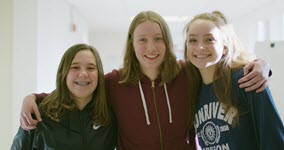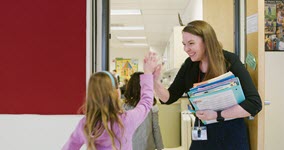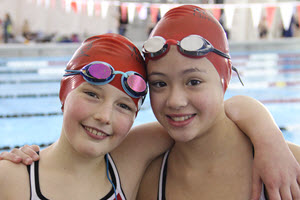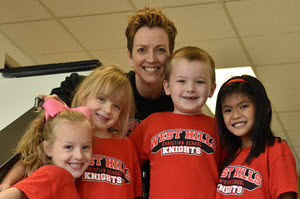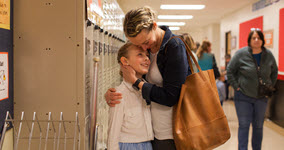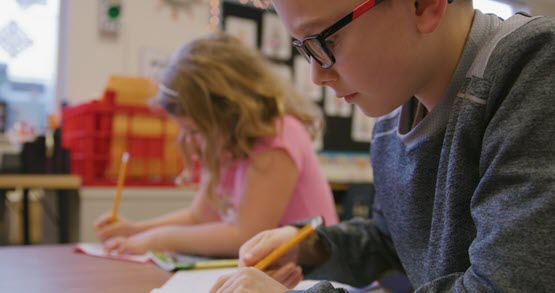
The K-5th classes are built around a curriculum that is Christ-centered, dynamic, research-based, and grade-appropriate. Our elementary students benefit from a strong academic foundation that allows them to excel in clarity of thought, academic intuition, and cognitive reasoning. Teachers intentionally develop lesson plans around the curriculum that promote hands-on learning, inspire engaging conversations, and spark curiosity – all integral to developing lifelong learners.
Below is a synopsis of the concepts and subject matter you can expect to be covered in your child’s class, including a few examples of the special projects, musical programs, and milestone events unique to each specific grade at West Hills.
Math: Developing strong number sense; beginning addition and subtraction skills; introducing geometry concepts through hands-on learning experiences.
Social Studies: Engaging students in an understanding of ourselves, our role in our families and in our community, as well as holidays and well known historical figures.
Writing: Introduction to the creative writing process through kid writing in which students are the author and illustrators of their own stories. Students use phonetic spelling and sight words to write their stories. Students will learn the basic elements of a story as well as beginning grammar skills with capitalization, punctuation, and parts of a sentence.
Handwriting: Developing fine motor skills through hands on letter activities as well as learning proper letter formation and the correct use of handwriting lines.
Reading: Development of strong phonological awareness and concepts of print through individualized reading instruction. Students will learn phonics skills to apply to decoding text in leveled readers and memorize numerous sight words to help them grow as beginning readers.
Science: Introducing students to science concepts through hands-on activities and integrated labs.
Bible: Emphasis on God’s attributes, the qualities of biblical characters, and what it means to know Jesus and live for him. Exposure through class activities and interactions with teachers and peers students learn to be Christ-like in their heart which is seen through words and actions.
Unique milestones: Field trips: pumpkin patch, CYT theater productions, Oregon Symphony KinderKonzert; Kindergarten Graduation ceremony (complete with caps and gowns!)
Math: Gaining experience with number sense and place value; establishing strategies in addition, subtraction, and base ten operations through problem solving.
Social Studies: Units developed around holidays, community, and developmentally appropriate current events. Students learn about American symbols, history, and places of interest. Students also learn about people and places around the world.
Handwriting: Continual progression in letter and number formation.
Writing: We introduce different types of writing such as narrative, opinion, descriptive, how to, and informational.
Phonics: Associating sounds with letters and spelling; awareness of how sound is formed in the mouth and how that is translated to the written letter and word.
Grammar: Introducing parts of speech, sentence types, and beginning writing mechanics.
Reading: Comprehension strategies and skills are introduced as reading develops. Emphasis on vocabulary, phonics and sight words.
Science: Employing observation skills for students to learn about themselves and the world around them.
Bible: Overview of Old and New Testaments through class discussions with focus on personal application, character development, and social and emotional skills.
Unique milestones: Spring Concert; animal dioramas; reading buddies with the 5th graders; zoo field trip.
Math: Strengthening addition and subtraction concepts, expanding to two or three-digit numbers; reinforcing problem-solving skills, number concepts, data & graphs, money, and time.
Social Studies: Awareness of community and history through the study of American History.
Writing: Introduction to steps of the writing process: researching, drafting, editing, revising and publishing. Exploration of narrative, opinion, informational, persuasive, and research writing.
Reading: Developing comprehension and increasing reading fluency through use of various texts; strengthening phonics and sight reading concepts.
Grammar: Parts of speech and sentence mechanics are applied in more detail.
Science: Observation versus theory; research skills; the study of the interaction between living and nonliving things.
Bible: Study of biblical characters; characteristics and traits of godliness.
Unique milestones: Spring Concert; insect reports.
Math: Addition & subtraction skills are reviewed and reinforced. Multiplication & division facts, strategies and properties are introduced and developed. Extensive problem-solving skills are integrated along with fractions, graphs and data, measurement, and geometry.
Social Studies: Significant figures in United States history are studied and presented in an interactive fashion.
Writing: Ongoing development of writing, editing skills, finalizing written papers, and sharing; identifying writing styles (i.e. informative, creative, opinion).
Reading: Strengthening foundational skills in reading comprehension and analysis; increasing reading fluency through understanding of character development, traits & language in different literature genres; book reports.
Grammar: Continued instruction on paragraph building, spelling and parts of speech (i.e. prepositions, verbs, adverbs, pronouns, contractions and conjunctions).
Handwriting: Cursive is introduced, practiced, and by the end of year, all work written in cursive.
Science: The study of the solar system, weather & climate, rocks & soil, cells & systems, plants, animals, and ecosystems.
Bible: Examining the life and times of Jesus and His disciples.
Unique milestones: Patriotic Program & Wax Museum (students dress up and give speeches as significant figures from United States history).
Math: Strengthening of skills in addition, subtraction, multiplication, and division; developing skills in comparing fractions, factors, adding/subtracting/multiplying fractions, geometry, and algebraic thinking.
Social Studies: Explorers of the Northwest, Native Americans of the Pacific Northwest, and Oregon history are researched and presented in interactive programs.
Writing: Encompasses writing conventions, organization, ideas, voice, word choice, and fluency.
Reading: Various genres are explored, growing the reader’s skills in main ideas, sequence, summarization, comprehension, character study, and fluency.
Grammar: Sentence structure, word relationship and usage, context and ongoing grammar skills.
Science: Earth’s land resources, properties of matter, animals, magnetism & electricity, weather & climate, body’s delivery systems.
Bible: Studies in the basic doctrine of the church.
Unique milestones: Patriotic Program & Wax Museum (students dress up and give speeches as significant figures from United States history); Parade of State Floats; participation in America’s Battle of the Books (ABB) through our Library program.
Math: Multiplying, dividing whole numbers; addition/subtraction/multiplication/division of decimals; comparing fractions; addition/subtraction/multiplication/division of fractions; data and measurement; and geometry.
Social Studies: Exploring the history of North America, from First Americans to English Colonization; from the Revolutionary War to the Civil War.
Writing: Continued advancement in complexity and creativity; students develop in ideas, word choice, voice, sentence fluency, organization, and conventions. Develop writing in narrative, expository and persuasive forms.
Reading: Focus on novel studies to increase student understanding of character, plot, setting, comparing and contrasting. Focus on nonfiction selection to understand the main idea, details and summarizing to develop students’ ability to read nonfiction text.
Grammar: Distinguishing usage; creating sentences and phrases; in-depth study of prepositions, nouns, verbs (including irregular verb forms), adverbs, adjectives and applying these to written work.
Science: Investigating how populations and ecosystems interact; examining light and sound, space and earth, physics, energy, and plant life through hands-on experiments.
Bible: Study the lives of Old Testament Patriarchs, Judges, and kings of Israel. Understanding the connections of the Promise of God that weaves through the Old Testament.
Unique milestones: Christmas Concert; reading buddies with the 2nd graders; participation in American Battle of the Books (ABB) through our Library program; first year eligible to serve in Student Council and band.

